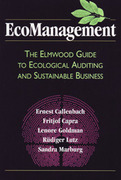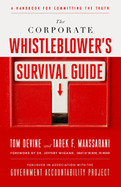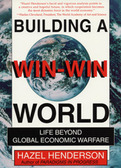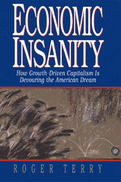1993
Business people need help reducing the impact of their companies on the environment. This book will help them identify what can be done, systematically set priorities, and create an action plan for implementing improvements. It will also help them sell an impact reduction program to their top management.
In contrast to the current practice of "compliance auditing," a process focused on meeting governmental regulations, this Elmwood Institute guide shows how to conduct an "eco-audit" - a complete examination of an organization in relation to its long-term ecological sustainability. Such an audit scrutinizes every aspect of the organization and its operations, including product design and manufacture, management techniques, corporate culture, and goals.
This book provides a comprehensive framework for companies that need to design their own audits. In addition, a set of thirteen checklists guide managers through the audit process, covering such topics as energy, materials, wastes, finance, marketing, transportation, and international business relations.
Business people need help reducing the impact of their companies on the environment. This book will help them identify what can be done, systematically set priorities, and create an action plan for implementing improvements. It will also help them sell an impact reduction program to their top management.
In contrast to the current practice of "compliance auditing," a process focused on meeting governmental regulations, this Elmwood Institute guide shows how to conduct an "eco-audit" - a complete examination of an organization in relation to its long-term ecological sustainability. Such an audit scrutinizes every aspect of the organization and its operations, including product design and manufacture, management techniques, corporate culture, and goals.
This book provides a comprehensive framework for companies that need to design their own audits. In addition, a set of thirteen checklists guide managers through the audit process, covering such topics as energy, materials, wastes, finance, marketing, transportation, and international business relations.
- The only detailed, comprehensive treatment of stakeholder theory-the most popular framework for discussions of business ethics-currently in print
- Examines stakeholder theory from the perspective of several fields of study, including strategic management, economics, moral and political philosophy, social psychology, and environmental ethics
- Provides a means for determining who are and are not stakeholders and why-including such controversial stakeholder candidates as competitors, activists, and the natural environment
-
Offers not just authoritative, accessible information but advice on every step of the whistleblowing process
-
Copublished with the Government Accountability Project, which has been aiding and protecting whistleblowers since 1977
-
Illustrated with vivid examples drawn from GAP's thirty-year history
- Click here for Press Release
Corporate whistleblowers save lives, prevent fraud, and preserve the environment. Some even become famous. But what the general public sees is the end result of a long, difficult, draining, and often frightening process. Whistleblowers rarely have any idea what they're in for and, daunted by the ferocity of the resistance and their feelings of isolation and helplessness, some give up, and others are broken financially and emotionally.
Blowing the whistle will always require courage and perseverance, but it no longer has to be done alone. The Corporate Whistleblower's Survival Guide will serve as an expert advisor for anyone contemplating bringing corporate wrongdoers to justice. Tom Devine and Tarek F. Maassarani draw on the accumulated experience of the Government Accountability Project, which since 1977 has helped over 5,000 people take on organizations like AIG, the World Bank, Procter & Gamble, Wyeth Pharmaceuticals--and win.
Devine and Maassarani detail every consideration potential whistleblowers should weigh and paint a vivid picture of the tactics corporations use to attack whistleblowers and cover up or deny damaging revelations. If you are considering blowing the whistle, this book offers hands-on, practical advice on every aspect of the process--finding information to support your claims, determining who to blow the whistle to, enlisting allies, and taking advantage of what legal options exist. The Corporate Whistleblower's Survival Guide will enable readers to bring vital information to light while keeping their sanity, relationships, and careers intact.
—Robert Reich, former US Secretary of Labor
Want to make misbehaving corporations mend their ways? You can! If you own their stock, corporations have to listen to you. Shareholder advocate Andrew Behar explains how to exercise your proxy voting rights to weigh in on corporate policies—you only need a single share of stock to do it. If you've got just $2,000 in stock, Behar shows how you can go further and file a resolution to directly address the board of directors. And even if your investments are in a workplace-sponsored 401(k) or a mutual fund, you can work with your fund manager to purge corporations from your portfolio that don't align with your values. Illustrated with inspiring stories of individuals who have gone up against corporate Goliaths and won, this book informs, inspires, and instructs investors how to unleash their power to change the world.
- Explores current economic trends in search of ways to accelerate human development that are sustainable within the earth's ecosystems
- Examines how social innovations are finding expression in new forms of enterprise, new institutions, partnerships, and cooperative agreements that can lead to the building of a win-win world
- Offers positive approaches for concerned citizens who accept that personal development and rights bring a greater responsibility for the human family
1995
"Economic insanity" describes what is happening in America and the wider world beyond its borders. The economy is out of control-out of our control-to the point that it is in control. The economy has divorced itself from the political and social ideals that define the American Dream, which has been transformed from an all-inclusive social ideal to an economic fantasy.
In Economic Insanity, Roger Terry explains how and why economics has come to dominate all aspects of our lives. Basic political, social, and moral values used to hold us together as a nation. Today, it seems, the economy is all that holds us together. The most drastic effects of the rise of Economic America are the impoverishing of democracy, the loss of liberty, and the abandonment of equality. Terry shows how our present system is failing at its most fundamental task-to provide for the physical needs and wants of human beings-and concludes that the system does not need fixing, it needs to be replaced.
This provocative proposal exposes the misconceptions that drive our economic system and offers systemic and revolutionary solutions. With passion and persuasiveness, Terry asserts that in order to recapture the American Dream, we must begin to subject the economy to the ideals of democracy, liberty, equality, and unity.
Terry questions, and suggests we abandon, four fundamental pillars of capitalism: endless economic growth, ever-increasing productivity, accelerating technological advances, and self-interest. He shows how these basic assumptions that drive our version of the free-market system are causing a host of interrelated and deeply entrenched problems. He explores critical social dilemmas that result from our current economic assumptions, including the loss of personal freedom and democracy, the perpetual and unavoidable increase in inequality, and the disuniting of America. If we are to turn our nation from this path of folly, Terry argues, we must first abandon the faulty assumptions that drive our thinking.
Terry proposes a solution that redefines the notion of capital ownership, creating a system of limited, widespread ownership in which individuals own only as much capital as they can make personal productive use of. Under this system, employees become owner/partners, power is returned to people, self-interest is defused, technology is harnessed, and meaningful equality is encouraged.
Incorporating ideas from Adam Smith and Thomas Paine to Paul Johnson and Herman Daly, Economic Insanity challenges readers to stop looking for answers within the system and look instead to changing the system.
- Shows America's economic system to be at odds with its social and political goals and proposes a system designed to increase personal freedom
- Questions the most basic assumptions that drive our economic system, and argues that its entire structure must be challenged


















